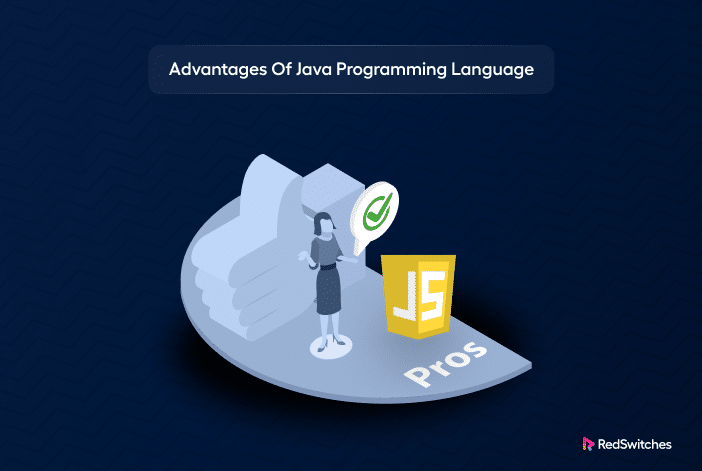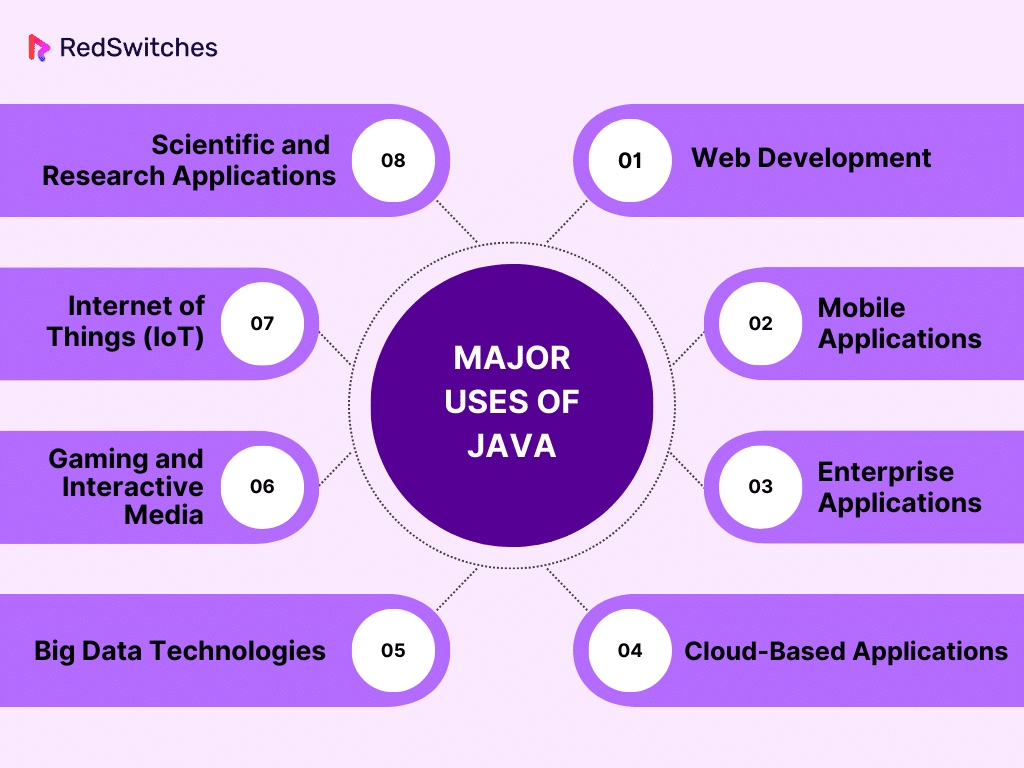In the ever-evolving landscape of programming languages, Java stands out as a perennial favorite, demonstrating remarkable resilience and adaptability. Since its inception over two decades ago, Java has carved a niche as one of the tech world’s most reliable, efficient, and versatile languages. Its widespread adoption is a testament to its robust architecture and the myriad advantages it offers developers and enterprises alike.
Java’s extensive application in building enterprise-scale applications, its pivotal role in Android app development, and its presence in emerging technology domains like the Internet of Things (IoT) further underscore its importance. As we delve into the 13 key advantages of Java, we uncover not just the reasons behind its sustained popularity but insights into how it continues to evolve and adapt in a dynamic technological landscape.
Let’s embark on this exploratory journey to understand the advantages of Java programming language and what makes Java a language of choice for millions of developers and countless applications across diverse domains.
Table of Contents
- What is the Java Programming Language?
- Advantages of Java Programming Language
- Major Uses Of Java
- Conclusion
- FAQs
Also, Read Install Java Ubuntu In Under 5 Minutes.
Credits: Pexels
What is the Java Programming Language?
Before starting to talk about the advantages of Java programming language, let’s understand what is Java programming language. Java’s journey began in the mid-1990s, conceived by a team of visionary engineers at Sun Microsystems. It was a time when the digital landscape was rapidly evolving, and there was a pressing need for a versatile programming language that could transcend platform boundaries.
This led to the birth of Java, which debuted in 1996, quickly becoming a game-changer in the software development world. Its core philosophy, “Write Once, Run Anywhere,” revolutionized how developers thought about code portability and efficiency.
Java’s Core Characteristics: Simplicity and Versatility
What sets Java apart is its blend of simplicity and power. Drawing inspiration from the syntax of C and C++, Java was crafted to be approachable yet potent. It eschews the complexities of its predecessors, like explicit pointers and operator overloading, paving the way for a more secure and streamlined coding experience. This balance makes Java an ideal starting point for beginners and a reliable tool for seasoned developers.
The Java Ecosystem: Beyond Just a Language
At the heart of Java’s cross-platform magic lies the Java Virtual Machine (JVM). This remarkable innovation translates Java bytecode into native machine code. This allows Java applications to run seamlessly across diverse environments, from desktops to mobile devices.
As Java evolved, it wasn’t just about the language; it became an entire ecosystem. The Java API, a comprehensive standard library, opened doors to many functionalities, from GUI development to network operations.
Java’s Evolution and Modern Relevance
Java has not rested on its laurels. Each iteration has brought forward enhancements in performance, security, and functionality.
Today, Java is not just a language; it’s a foundation upon which modern enterprise applications, Android apps, web servers, and even big data technologies are built. Its ability to adapt and grow has kept it relevant in an industry constantly in flux.
A Language for All Seasons
Java’s story is one of resilience and continuous innovation. From its humble beginnings to becoming the backbone of millions of applications worldwide, Java has stood the test of time. Its widespread adoption in various sectors, backed by a robust community and corporate giants like Oracle, cements its place as a cornerstone in the programming universe.
Also Read JDK vs JRE vs JVM: 5 Key Differences Of The Powerhouse Trio Behind Java
Advantages of Java Programming Language
Credits: Freepik
In the dynamic world of software development, Java emerges as a beacon of reliability, versatility, and innovation. Its staying power in the industry is not just a stroke of luck; it’s a testament to the myriad benefits of java programming it brings to the table.
Java is more than a programming language—it’s a solution that has continually adapted to the changing tides of technology, offering a blend of features that cater to developers and businesses alike.
Let’s embark on a journey to explore these advantages of Java programming language, each one highlighting why Java continues to be a preferred choice for so many in the tech world.
Reliability
The robustness is one of the key advantages of Java programming language, ensuring reliable and stable applications.
- Error Handling and Robustness: Java’s approach to error handling is proactive, emphasizing early detection of potential issues. Its robust exception-handling mechanisms are designed to catch and manage errors during development, not just runtime. This early intervention strategy leads to more secure and stable applications, preventing many common runtime errors and vulnerabilities from reaching the end user.
- Garbage Collection: A standout feature of Java’s memory management is its garbage collection process. This automated system continuously monitors and identifies objects no longer in use and reclaims their memory space. This process is crucial in preventing memory leaks and other memory-related issues, thus enhancing Java applications’ overall reliability and efficiency.
- Strong Typing: Java’s robust type-checking mechanism at compile time significantly affects its reliability. By ensuring that variables are pre-defined and consistent, Java reduces the likelihood of type errors, one of the most common issues in programming. This robust typing system helps catch many programming errors at the very early stage of development, further contributing to the robustness of the final application.
Multithreading
Leverage the advantages of Java programming language with Java’s multithreading capabilities for improved performance and efficiency.
- Concurrent Execution: Java’s ability to run multiple threads concurrently is a significant advantage. This means different parts of a program can execute simultaneously, leading to better utilization of CPU resources. This concurrent execution is particularly beneficial in processing complex programs and can dramatically speed up application performance.
- Improved Application Performance: Applications that demand high responsiveness, such as online games or real-time web services, greatly benefit from Java’s multithreading capabilities. By handling multiple threads of execution simultaneously, Java ensures smoother, more efficient operation of these applications.
- Synchronization: Dealing with multiple threads can introduce complexity, especially regarding data consistency and thread safety. Java addresses this by providing built-in synchronization capabilities.
These tools help developers manage and synchronize the activities of multiple threads, ensuring that data remains consistent and eliminating the risks of thread interference and memory consistency errors. This synchronization is key to maintaining the integrity and reliability of applications in multi-threaded environments.
Platform Independence
Java’s platform independence is a fundamental one in the list of advantages of Java programming language, enabling code to run seamlessly on any system.
- Write Once, Run Anywhere (WORA): Java’s architecture is designed around the concept of WORA. Java programs are written and compiled into bytecode, a middle stage between source and executable codes.
This bytecode is not specific to any processor or operating system. Instead, it can be executed on any machine with a Java Virtual Machine (JVM). The JVM is an interpreter between the bytecode and the machine’s specific instruction set and OS. This makes Java programs highly portable.
- Cross-Platform Compatibility: The JVM is available for many platforms, including major operating systems like Windows, macOS, and Linux. When you develop a Java application, you don’t need to worry about the underlying OS of the end user’s machine.
This cross-platform nature simplifies the deployment process, as the same Java application can run seamlessly across different environments without any modifications.
- Versatile Application Development: This platform independence extends Java’s utility across various domains. Java provides a consistent development environment, whether for developing desktop applications, server-side solutions, mobile applications through Android, or even embedded systems. This versatility makes it a preferred choice for developers who target multiple platforms.
Also, Read Unraveling the Differences Between Minecraft Java vs Windows: A Detailed Guide
Object-Oriented Programming (OOP)
Utilize Java’s object-oriented features is a core advantage in the list of advantages of Java programming language for modular and flexible code design.
Credit: Freepik
- Encapsulation and Modularity: In Java, encapsulation is achieved by bundling the data (variables) and code (methods) that operate on the data into a single unit called an object. This not only helps in keeping the data safe from outside interference and misuse but also enhances modularity. Modularity divides a program into modules that can be developed, tested, and debugged independently.
- Inheritance and Reusability: Java uses inheritance, a mechanism where a new class (derived class) can inherit properties and behaviors (methods) from an existing class (base class). This feature promotes code reusability. Developers can extend existing classes instead of writing new code from scratch, making Java development faster and more efficient.
- Polymorphism: Polymorphism in Java allows objects to be treated as instances of their parent class rather than their actual class. The same method or property call can behave differently depending on the type of object that invokes it. This ability is crucial for designing flexible and easily maintainable code, enabling developers to write code that can handle different types of objects at runtime.
Distributed Computing
Java’s distributed nature highlights the advantages of Java programming language in creating network-centric applications.
- Networking Capability: Java’s robust networking capabilities are a core part of its architecture. It provides extensive support for TCP/IP protocols, which are fundamental for internet communications. Java simplifies the task of working with sockets and performing network operations, making it a preferred choice for building network-based applications.
- Remote Method Invocation (RMI): Java’s RMI feature allows a Java program to invoke methods on objects that reside on different servers or applications. This is a crucial feature for distributed computing, as it facilitates communication and operations across different machines and environments, making it easier to develop distributed applications that are both efficient and robust.
- Scalability in Distributed Environments: Java is inherently scalable, a key requirement for modern, cloud-based applications. Its distributed nature allows for effective load balancing and resource management, essential in cloud environments where applications must scale dynamically based on demand.
Heightened Security
Java enhances security, critical advantages of Java programming language, safeguarding your applications against external threats
- Secure Runtime Environment: The Java Virtual Machine (JVM) is designed with security in mind. It implements a secure execution environment, often called a “sandbox,” that restricts untrusted code from accessing critical system resources and APIs, thereby preventing harmful operations.
- Classloader and Bytecode Verifier: Java enhances security through its classloader mechanism, ensuring only valid Java bytecode is executed. Additionally, the bytecode verifier checks code fragments for illegal operations that could violate access rights, adding an extra layer of security against malicious code.
- Security APIs: Java offers a comprehensive set of security APIs that support cryptography, secure communication, authentication, and access control. These APIs are essential for developing applications that handle sensitive data or transactions, cementing Java’s role as a secure programming language.
Easy-to-learn Language
Java’s simplicity and user-friendliness underscore the advantages of Java programming language in easing the learning curve for beginners.
- Simple Syntax: Java’s syntax is designed to be clean and straightforward, making it more accessible, especially for those new to programming. It resembles C++ but without many more complex, low-level aspects, making it easier for beginners to grasp.
- Extensive Resources and Community Support: The Java community is vast and active, offering a wealth of resources for learners. This includes comprehensive documentation, online tutorials, forums, and community support, all contributing to a more supportive learning environment.
- Strong IDE Support: Java’s compatibility with powerful Integrated Development Environments (IDEs) like Eclipse and IntelliJ IDEA provides beginners with tools like advanced code assistance, debugging, and code management features. This support significantly eases the learning process, allowing new programmers to focus more on learning the language and less on the intricacies of the development environment.
Also Read The Power of In-Memory Databases: A Comprehensive Guide with 9 Examples
Memory Management
Effective memory management in Java showcases the advantages of Java programming language in optimizing resource usage.
- Heap Memory Utilization: In Java, when objects are created, they are stored in a region of memory known as the heap. This memory allocation is handled automatically by the Java runtime. The developer doesn’t need to explicitly allocate memory for new objects, unlike in languages like C or C++, where manual memory management is required.
- Abstraction from Manual Management: This automatic handling of memory allocation abstracts away the complexities and potential errors associated with manual memory management. It reduces the risk of improper memory allocation, memory leaks, and buffer overflows, which are common in languages requiring explicit memory management.
- Scope-Based Memory Release: Java leverages scope-based memory management. This means that an object’s memory is managed based on its scope of accessibility. When an object is no longer in use (i.e., it goes out of scope), it becomes eligible for garbage collection. This approach automates the process of memory cleanup once the objects are not needed, simplifying the developer’s job.
Automated Garbage Collection
Java’s automated garbage collection illustrates the advantages of Java programming language in managing memory and improving performance.
- Automatic Cleanup Mechanism: Java’s garbage collector is a background process that identifies objects that are no longer being used and reclaims their memory. This automatic cleanup process helps manage memory efficiently and prevents memory leaks, a common concern in manual memory management systems.
- Performance Optimization: There’s a common misconception that garbage collection significantly impacts performance. Modern Java Virtual Machines (JVMs) have advanced garbage collection algorithms optimized for minimal disruption.
These include generational garbage collection, concurrent mark-sweep, and others, ensuring that the garbage collection process is as efficient as possible, reducing the impact on application performance.
- Enhanced Safety and Stability: By automating the memory management process, Java enhances the safety and stability of applications. The garbage collector manages the lifecycle of objects, freeing up memory that is no longer needed and ensuring that the application does not run out of memory or misuse memory resources. This automated process contributes to the overall reliability and efficiency of Java applications.
Code Portability and Versatility
Embrace the advantages of Java programming language with Java’s code portability and versatility, ensuring cross-platform compatibility
- Cross-Platform Compatibility: Java’s philosophy of “Write Once, Run Anywhere” (WORA) is a cornerstone of its design. Java programs are compiled into bytecode, which can be executed on any platform with a compatible Java Virtual Machine (JVM). This cross-platform capability ensures that Java applications are portable across different operating systems and platforms without rewriting or recompiling the code for each specific platform.
- Adaptability Across Domains: Java’s versatility is reflected in its applicability to various computing domains. It’s extensively used in web development, creating server-side applications, and building robust mobile applications, especially for Android. Furthermore, Java is significant in big data solutions, cloud computing, and enterprise-level applications. Its robustness, security features, and scalability make it an ideal choice for large-scale and complex applications.
Open-source Library Support
Java’s extensive open-source library support exemplifies the advantages of Java programming language in providing a wealth of resources.
- Rich Set of Libraries: Java is known for its extensive collection of open-source libraries. These libraries cover almost every functionality, from essential utilities to advanced capabilities like data analysis, machine learning, and network programming. The availability of these libraries greatly enhances Java’s functionality and makes it a versatile tool for developers.
- Community Contributions: The strength of Java also lies in its vibrant and active community. Developers and contributors from around the world continuously contribute to the development and enhancement of these libraries. This collective effort ensures that Java libraries are diverse and up-to-date with technological advancements.
- Ease of Integration: One of the significant advantages of Java’s open-source libraries is their ease of integration into various projects. Most libraries are well-documented and can be seamlessly incorporated into Java applications, which helps in reducing development time and effort. Whether adding complex functionalities or simplifying routine tasks, these libraries provide Java developers with a wealth of resources to enhance their applications.
Widespread Industry Use
Java’s high demand in the industry reflects the ongoing advantages of Java programming language in career opportunities and market relevance.
- Reliability and Scalability: Java has been a mainstay in programming due to its robustness, reliability, and scalability. These qualities make it an ideal choice for large-scale, high-performance applications. Many large corporations, especially in the finance, healthcare, and technology sectors, rely on Java for their critical systems, which in turn creates a consistent demand for skilled Java developers.
- Versatile Career Opportunities: Proficiency in Java can open doors to various career paths. Given its wide application in different areas, Java developers can find opportunities in backend development, mobile app development (mainly Android), enterprise solutions, and emerging fields like big data and cloud computing. This versatility ensures that Java skills remain valuable and sought-after in the job market.
Also, read Everything You Need to Know About Virtual Machines and Cloud Computing
Updated Features
Regular updates in Java highlight the advantages of Java programming language in keeping pace with the latest technological advancements.
- Regular Updates: Java is known for its commitment to staying current. Regular updates are released, adding new features, improving performance, and enhancing security. These updates help Java to keep pace with the evolving technology landscape, making it a continually relevant skill for developers.
- Modern Language Features: Java updates have introduced modern features like lambda expressions for functional programming, the stream API for simplified data processing, and a strong focus on modularization. These features align Java with current programming paradigms and practices, making it a powerful and modern language.
- Community and Corporate Support: The strength of Java is also bolstered by its community and corporate support. The active involvement of the open-source community in developing and enhancing Java tools and libraries adds to its richness. Corporate backing, most notably by Oracle, ensures that Java gets the necessary support for development, maintenance, and innovation. This combination of community and corporate investment keeps Java at the forefront of technology trends.
The Java programming language, renowned for its robustness and flexibility, stands as a beacon in software development. Its diverse range of features caters to developers’ needs and adapts to the ever-evolving technological landscape. From its unparalleled reliability to its ease of learning, many advantages of Java programming language make it a preferred choice for professionals and hobbyists alike. The following table succinctly outlines the key advantages of Java programming language, each highlighting a unique aspect of this versatile language.
Whether it’s the seamless platform independence, the efficiency of multithreading, or the security protocols that safeguard your code, Java’s capabilities are as extensive as they are impressive. This table serves as a quick guide to understanding why Java continues to be a cornerstone in modern programming.
Major Uses Of Java
In this analysis of the advantages of Java programming language with a rich history and a bright future has cemented its place as a cornerstone of the software development world. Its versatility and robustness make it the go-to choice for various applications across various domains. Let’s explore the significant uses of Java that showcase its omnipresence and enduring relevance in the tech landscape.
Credits: Freepik
Web Development
Java’s extensive use in web development is attributed to its secure, scalable, and robust nature. Java Enterprise Edition (JEE) offers a powerful platform for building large-scale, distributed web and enterprise applications. Popular frameworks like Spring and Hibernate further simplify the development process, making Java a preferred choice for creating dynamic websites and web applications.
Mobile Applications
Java’s foray into the mobile world, mainly through Android, has been revolutionary. As the primary language for Android app development, Java enables the creating of diverse and dynamic mobile applications. Its compatibility with Android SDK provides developers with a rich set of tools and APIs to craft applications that range from essential utility apps to complex gaming experiences.
Enterprise Applications
Java’s stability and security features are unparalleled in the realm of enterprise applications. Large corporations and businesses rely on Java for their back-end systems and critical application infrastructure. The language’s ability to handle large data sets and complex transaction management makes it ideal for banking, financial services, insurance, and e-commerce platforms.
Cloud-Based Applications
With the rise of cloud computing, Java has emerged as a popular choice for building cloud-based applications. It’s platform independence and robust security features align well with the demands of cloud computing. Java’s compatibility with popular cloud platforms like AWS and Azure enables seamless integration and deployment of scalable, cloud-native applications.
Big Data Technologies
Java’s role in big data technologies underscores its ability to handle massive data processing and analysis. Frameworks like Apache Hadoop and Spark, which are predominantly Java-based, facilitate processing large data sets distributed across computing clusters. Java’s performance in high-computing environments makes it a favored language for data scientists and analysts.
Gaming and Interactive Media
The gaming industry has also seen Java’s adoption, especially in server-side development for online games. Its robustness and the ability to handle concurrent processing make it suitable for creating real-time, multiplayer gaming environments. Moreover, Java’s rich set of libraries and APIs allows for the development of engaging and interactive media content.
Internet of Things (IoT)
Java extends its reach into the burgeoning field of IoT. Its platform independence and portability are vital in IoT ecosystems, where Java can run on a wide range of devices, from consumer gadgets to sophisticated industrial equipment. Java’s security features and efficient processing capabilities make it a strong candidate for IoT applications.
Credits: Freepik
Scientific and Research Applications
Java’s stability and high performance are crucial in scientific and research domains. Its use in simulations, data analysis, and computational research reflects its capability to handle complex mathematical operations and algorithms. Java’s cross-platform nature facilitates collaboration and sharing of research tools and applications across different systems.
In summary, Java’s primary uses span virtually every technology sector. Its ability to adapt to different environments and its reliability and performance have made it a foundational tool in the tech industry. From powering the smallest mobile devices to driving large-scale enterprise systems, Java’s presence is deeply woven into the fabric of modern technology.
Conclusion
Wrapping up the advantages of Java programming language, its extraordinary versatility and robustness have made it a pivotal force in shaping the landscape of modern technology. From web development to cloud computing and enterprise solutions to the Internet of Things, Java’s capabilities are as broad as they are profound. Its role in driving innovation and efficiency across various sectors is undeniable.
As you ponder the advantages of Java programming language, it’s crucial to consider the infrastructure supporting your Java-based projects. This is where RedSwitches comes into the picture. RedSwitches, with its state-of-the-art hosting solutions, offers the perfect foundation for your Java applications. Whether deploying complex enterprise systems, delving into the world of big data, or crafting the next revolutionary Android app, RedSwitches provides the reliability, scalability, and performance your projects demand.
Embrace the power of Java and let RedSwitches be the catalyst for your success. Discover how RedSwitches can elevate your Java applications to new heights with their Dedicated Servers.
FAQs
Q. What is the advantage of Java method?
Java methods provide several key benefits, such as enhancing code modularity by breaking complex tasks into smaller, reusable units. This improves code readability and maintainability and promotes code reusability, reducing redundancy. Additionally, methods in Java encapsulate complex operations, simplifying the programming process and making the code more intuitive and easier to debug and test.
Q. What is Java language useful for?
The Java language is versatile and widely used for developing dynamic web applications, mobile apps (especially in the Android ecosystem), and enterprise solutions. Its robustness and scalability make it ideal for handling large-scale, complex business applications. Additionally, Java is significant in the big data space, often used in frameworks like Apache Hadoop, and is also a popular choice for developing cloud-based and IoT applications.
Q. What are the advantages and disadvantages of Java?
Java is renowned for its platform independence, object-oriented structure, and substantial memory management, enabling efficient, secure, and versatile programming. However, Java can be slower than languages like C++ and might be challenging for beginners. Its resource-intensive nature also demands more memory and processing power.
Q. What are the advantages of using classes in Java?
Using classes in Java offers several advantages, such as encapsulation, which bundles data and methods, enhancing data protection. Inheritance in classes promotes code reusability, while polymorphism allows objects to be treated as instances of their parent class, enhancing flexibility. Classes also provide a clear organizational structure crucial for managing large applications.
Q. What is Java programming language?
Java is a widely used programming language known for its versatility and portability. It is an object-oriented language that can be used for developing a wide range of applications and software.
Q. What are the advantages of using Java?
Java offers various advantages such as platform independence, strong memory management, automatic garbage collection, and a robust set of libraries and frameworks.
Q. How is Java used in software development?
Java is used in software development to create applications, web-based projects, enterprise systems, mobile apps, and more. It is a popular choice for building scalable and secure software solutions.
Q. What is the role of Java developers?
Java developers are responsible for designing, implementing, and maintaining Java-based applications. They write and optimize code, troubleshoot software issues, and ensure the quality and performance of the software.
Q. What is the significance of Java Virtual Machine (JVM) in Java development?
JVM plays a crucial role in executing Java bytecode and converting it into machine code. It provides a runtime environment for Java programs, allowing them to run on any platform that supports JVM.
Q. How does Java support functional programming?
Java supports functional programming through features like lambda expressions, stream API, and functional interfaces. These features enable developers to write concise and expressive code for functional programming paradigms.
Q. What are the key benefits of using Java frameworks?
Java frameworks offer benefits such as rapid application development, code reusability, simplified maintenance, and integration with other technologies. Popular frameworks like Spring and Hibernate are widely used in Java development.
Q. Why is there a high demand for Java in the software industry?
Java’s versatility, robustness, and widespread adoption across various domains contribute to its high demand in the software industry. It is also favored for its scalability, security features, and extensive community support.
Q. Is Java an easy programming language to learn?
Yes, Java is often considered an easy language for beginners to learn due to its simple syntax, extensive documentation, and abundant learning resources. Its popularity and demand also make it a valuable skill to acquire for aspiring developers.
Q. What is the significance of offshore Java development?
Offshore Java development involves outsourcing software development projects to offshore teams or companies. It offers cost savings, access to skilled Java developers, and can accelerate the development process for businesses.







